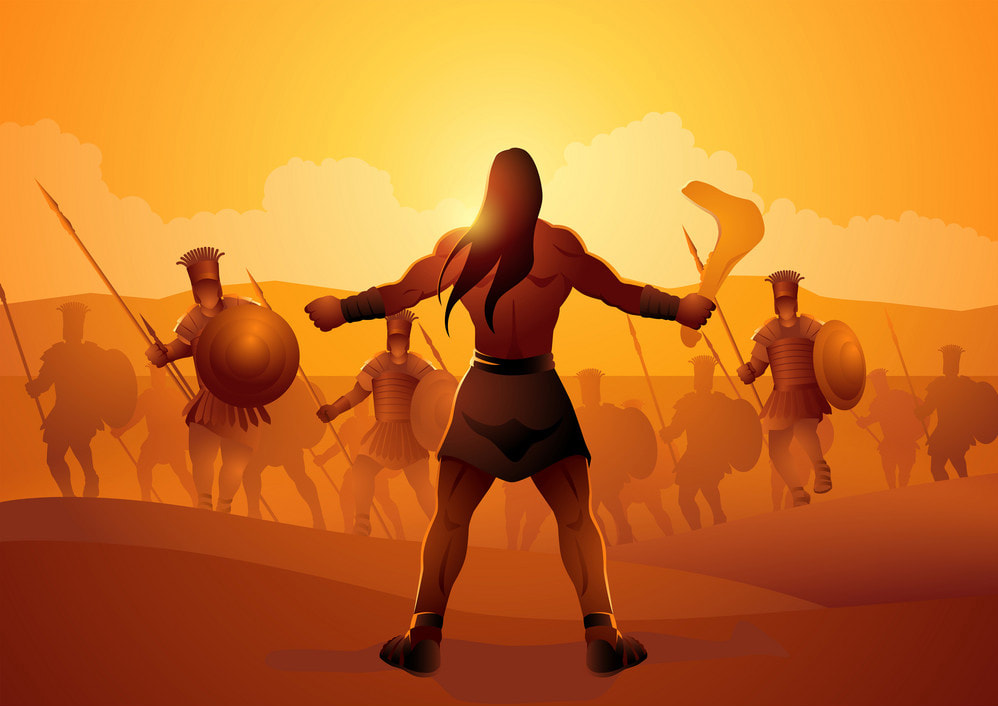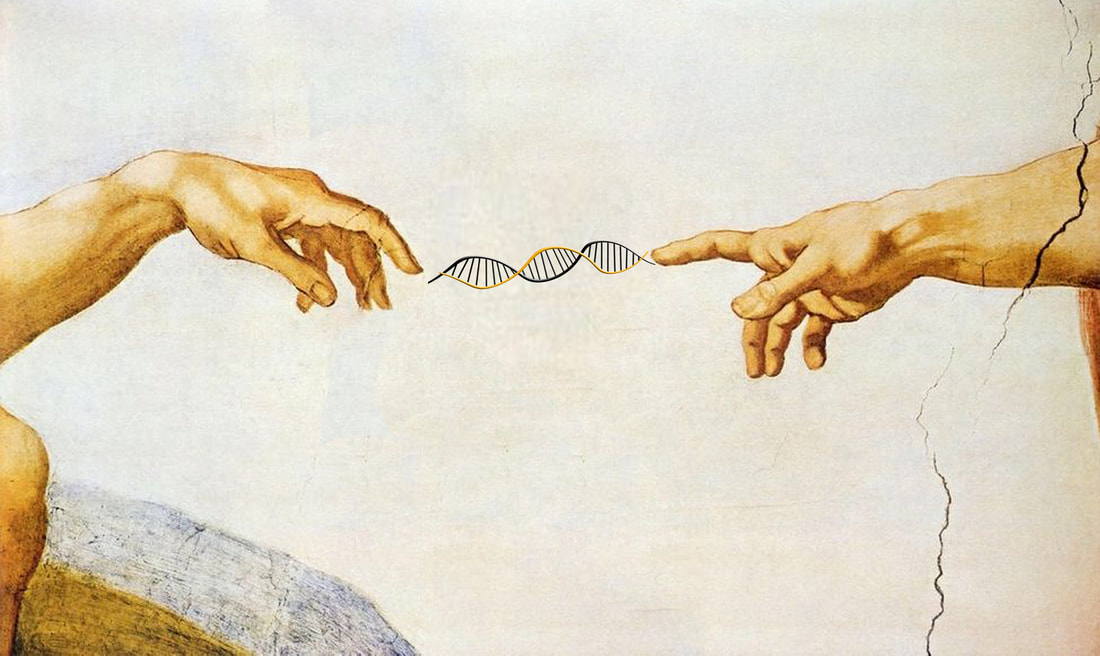|
A Christopher Wright Sermon Summary Humans have caused lots of suffering. Genesis 3 describes how the devil tempted humans into rejecting God’s authority, distrusting His goodness, and disobeying Him, which led to the downfall of mankind.
The Bible doesn’t explain the origin of the devil but describes the devil as an angel rebelled and fought against God, such as attacking Christ throughout His ministry[1]. Despite this, the devil still exists under God’s authority. God doesn't create evil because there is no darkness in God[2]. Though we can’t make sense of the devil, we need to reject and resist him[3]. We also can’t make sense of natural disasters and catastrophic pandemics, which cause suffering as well. The curse on the ground in Genesis 3 didn’t cause them because that curse was on humans[4]. The story of Job teaches us that suffering is not necessarily a punishment from God[5]. Natural disasters have existed all along. If God used disasters to punish, He would’ve stated so. Many in the Bible, including Job, Jeremiah, and numerous psalmists, lamented and questioned their loving and all-powerful God. They complained furiously, protesting to God’s slowness in responding. Yet, they still believed in God’s sovereignty and goodness[6]. We also need to trust God being in charge. We need to believe that all things work together for His purpose, as seen in the life of Joseph[7]. Similarly, we need to trust God’s goodness. The cross demonstrates His goodness, as well as the wickedness of Satan and men under their free will. But God’s sovereignty weaves all these together for our good[8]. Finally, Revelation teaches that God is at the center of the universe, with all creation around Him. Only Christ can understand human history, not us[9]. And God’s sovereignty overrides all evilness, with God judging the wicked and saving His people[10]. In the end, Christ will rule over everything, with all evil, death, pain, shame, deceit, impurity, and curse eradicated[11]. In His sovereignty, God weaves evil into His purpose to redeem the whole of creation, accomplishing the greatest good[12]. This is our wonderful hope, in which we have total confidence and incomparable joy. Summarized from Chapters 1-3 of The God I Don’t Understand: Reflections on Tough Questions of Faith” by Christopher Wright. 1 2 Peter 2:4, Jude 6, Revelation 12:7-9 2 Habakkuk 1:13, 1 John 1:5 3 Ephesians 6:11, 1 Peter 5:8-9 4 Genesis 3:17, Romans 8:20-21 5 John 9:1-3, Luke 13:1-5 6 Job 19:6-8; Jeremiah 15:10-21, 17:14-18, 20:7-18; Lamentations 2:11-12; Amos 3:6; Isaiah 45:7; and Psalms 10, 12, 13, 28, 30, 38, 56, 69, 88 7 Genesis 45:4-8 8 Acts 2:22-24, 36-38 9 Revelation 4&5 10 Revelation 6&7 11 Revelation 21:1-4; 22:3 12 Revelation 21-22
0 Comments
Thomas Schreiner Sermons Summary The following addresses some questions in Christianity.
Many Old Testament (OT) requirements were specifically for the Israelites at a specific time, and Christians are not required to observe them today. But Christ’s new commands of loving God and our neighbors are for all nations (Galatians 6:2, 5:14, 3:23-25; 1 Corinthians 9:20-21; Matthew 22:37-40). Christians still keep OT requirements that are also under Christ’s new rules, such as refraining from adultery and murder. Tithing was an OT requirement tied to the Tabernacle and priests (Hebrews 8:6-13, 7:12-22). Christ discussed tithing because the Jews at the time were still under the old covenant (Matthew 23:23). Though Christians don’t have to tithe, giving sacrificially and generously will increase our joy (2 Corinthians 8-9). Speaking in tongues is a gift of speaking in different languages (Acts 10, 11, and 19). Some incorrectly equate speaking in tongues to baptism of the Spirit; all are baptized by the Spirit at conversion, but only some can speak in tongues (1 Corinthians 12:7-12, 27-31). Speaking in tongues occurred in the Bible for specific purposes, such as demonstrating Gentiles being saved, and salvation not via John’s baptism of repentance (Acts 10, 19:1-7). Love is more important even than speaking in the tongues of angels, let alone tongues of men (1 Corinthians 13:1, 14:2-11). The 144,000 in Revelation 7 and 14 symbolize all believers, not the Jews, because (a) they can withstand God’s wrath in Revelation 6 (Revelation 7); (b) they are the redeemed (Revelation 14); (c) hearing Judah’s lion and seeing the lamb are similar to hearing the 144,000 but seeing uncountable multitudes (Revelation 5, 7); (d) the number 12x12 is symbolic in nature; (e) Jews can be under Satan, and Gentiles can be Abraham’s children (Revelation 2:9; Galatians 3:7, 29; Romans 4:11-18; Ephesians 2:11-22); (f) the twelve tribes lack the tribe of Dan (Revelation 7); and (g) most Jews don’t know their originating tribes, so literally fulfilling the 144,000 prophecy is probably meaningless. Summarized from four Thomas Schreiner short sermons: “Do Christians have to obey the Old Testament Laws?” https://www.youtube.com/watch?v=jm_-BPFVIgc Is tithing biblical? https://www.youtube.com/watch?v=FnDKgXCHfGU What is the gift of tongues? https://www.youtube.com/watch?v=V--IHR6aGz4 Who are the 144,000 in Revelation? https://www.youtube.com/watch?v=g5JnzsB13SQ Was God cruel and unreasonable in the Old Testament (OT)? (Joshua 8:24-26, 1Samuel 15:2-3, Deuteronomy 2:34, 2Samuel 6:6-7, and Job 2:3) It depends on how you define right and wrong. According to Humanism, a moral compass inside us defines right and wrong. In Confucianism, heaven places this compass (goodness) into us. This compass judges everything, including whether God is cruel. If so, this compass is above God. Note that the moral compass can differ, depending on race and historical time. Another doctrine is that God determines right and wrong. God reveals His nature to us generally and specifically. Generally, His nature is revealed by His creation (Roman 1:20). Specifically, God reveals His nature through Christ (Hebrews 1:1-3) and the Bible. Liberal theology accepts the parts of the Bible that can pass through their rationale. Catholics defer to their experts, with the infallible Pope at the top. As for Evangelists, what the Bible says is what God says. Evangelism accepts there are parts in the Bible we won’t understand (I Corinthians 13:12). Evangelism also accepts many Biblical descriptions as prophecies or precursors of things to come. Many passages in the OT predict and foreshadow Christ’s redeeming sacrifice (Luke 24:44), such as Abraham sacrificing Isaac. Another set of precursors refers to the end times, when God will establish a new heaven and earth (Eschatology). Technically speaking, such biblical events aren’t “historical” because they aren’t repeatable on earth, while historical events can happen again. Examples include God’s miracles and Christ’s resurrection. Other examples include certain catastrophic events in the OT that demonstrate God’s judgment in the end times. These parts of the Bible aren’t for teaching ethics for the current time but are about the world to come. In conclusion, if we are the ultimate arbiters of right and wrong, then we might consider some of God’s actions in the OT as cruel. But if God is the ultimate moral authority, then we need to accept God’s total sovereignty in all things—He is the one who decides; may His name be praised whether He gives or takes away (Job 1:21). 旧约中的上帝残酷吗?
旧约时代的上帝残酷无情的吗(约书亚记 8:24-26, 撒母耳记上 15:2-3, 申命记 2:34, 撒母耳记下 6:6-7, 约伯记 2:3)? 问题的答案取决于对与错的定义。 人文主义根据人内心的道德指南来定义是非。儒家思想认为上天把这善的指南放在人心中。 这个指南审判一切,包括上帝是否残酷。 如此它就凌驾于上帝之上。 请注意它可以根据种族和历史时间而变化。 另一个教义是上帝判断是非对错。 上帝普遍而又特别地显明祂的本性。普遍来说,祂在创造中显明祂的本性(罗马书 1:20); 特别来说,祂通过基督(希伯来书 1:1-3)和圣经显明祂的本性。 自由神学只接受通过其理论那部分的圣经。 天主教听从自己的专家,永远无误的教皇在其间居首。 福音派相信圣经所言就是上帝所言。 福音派接受圣经中有现在无法理解的部分(哥林多前书 13:12),也接受许多圣经的描述为未来事物的先兆。 旧约中的许多章节都预言和预示基督救赎之牺牲(路加福音 24:44),例如亚伯拉罕献以撒是父神牺牲基督的先兆。 另一组前兆针对末日,那时上帝要建立新天新地(末世论)。 这些事件本质上不是历史事件,因为它们在地上不会重复,而历史事件可以再次发生。相关的例子包括一些神迹和基督的复活,还包括旧约中某些灾难性事件 - 它们展示了上帝在末日的审判。圣经的这些部分并非为要教导当今时代的伦理,而是对未来的世界的前兆。 总而言之,如果是非对错的最终决定者是人,就可能认为上帝在旧约中的一些行为是残酷的。 但如果上帝是最终的道德权威,人就需要接受上帝对万物的完全主权--祂是一切的决定者; 无论祂给予还是夺走,祂的名是应当称颂的(约伯记 1:21)。 Many see Christ as a moral teacher, highly ethical, full of wisdom, with a brilliant and sane mind.
But Christ can never be considered just a moral teacher. Some even consider Him a lunatic or a megalomaniac. See some of His offending remarks below:
Other religions claim to have the truth, but Christ proclaimed:
Could His followers have created such remarks? Unlikely as they came from a nation convinced of only one God. Initially they were also reluctant to embrace Jesus’s claims. Could Christ be a legend? According to literary historian CS Lewis, too many descriptions in the story are clumsy, not artistic enough, and not properly explained to have been created as a legend. Hardly any ancient literature includes dialogue like the four gospels. Someone building a legend wouldn’t allow this to happen. Also, realistic novels only came about a hundred years ago. It is difficult to come up with an alternative explanation for Christ, other than He was telling the truth: God, coming to earth to become a man, died and resurrected. If Christ is what He said He is, ignoring Him would be catastrophic. So, choose wisely. A summary of a presentation by CS Lewis: https://www.youtube.com/watch?v=yGU2JN2a3Cs 我们应该怎样看待基督? 许多人认为基督是道德教师,品德高尚,充满智慧, 拥有杰出而理智的头脑。 但基督绝不可能仅仅是一个道德老师。有些人甚至认为祂是个疯子或自大狂。 看看祂的一些骇人听闻的言论:
其它宗教声称拥有真理,但基督宣称:
这些言论可能是祂的追随者编造的吗? 这是不合理的,因为以色列是一个相信只有一位上帝的民族。 此外,最初他们也不愿意接受基督的这些宣告。 基督可能只是一个传奇吗? 根据文学史学家 CS Lewis 的分析,基督不太可能是传奇,因为这个故事中的很多描写都很笨拙,不够艺术,也没有恰当的解释。 在古代文学中几乎没有像四福音这样的对话。 建立传奇的人不会允许这种情况发生。 此外,现实主义小说大约在一百年前才出现。 很难对基督提出其它合理的替代解释,除了祂说的话是真实的: 上帝降世为人,死了,又复活。 如果基督是祂所说的,忽视祂的后果将是灾难性的,所以做出明智的选择吧! Our natural environment, such as the stars, cosmos, and atoms, witnesses God and His glory (Psalm 19:1, Romans 1:19-21). But God is beyond us.
Christ is the image of God, full of grace and truth (John 1:14, 14:8-9; 2 Corinthians 4:4). He shows us our amazing God. He became a man, humbly teaching, serving, and suffering till death for us. It is difficult not to believe Christ based on what He said and did. Many of Christ’s disciples died for Him. Given Christ’s life, death, and resurrection as depicted in the Gospel and corresponding evidence, we can understand those disciples’ behavior. Their behaviors endorse Christ. The character of the New Testament’s writers, as illustrated in their writings, is further endorsement of Christ, such as John and Paul, the latter of whom wrote 13 letters in the NT. Their writings preclude us from considering them liars or lunatics, as they demonstrate a character supporting the truthfulness of their writings. We assume that we and our work have some significance, and we aren’t just talking nonsense. Such assumptions require accepting certain fundamental laws of logic, causality, and existence. These laws can’t have any bearing of significance unless they are rooted in God. For example, when you write poetry, you don’t want others to consider it like a dog barking. You want others to take you seriously and understand the messages you are trying to convey. Therefore, you are assuming something important as the basis of what you’re doing, which is only possible with this Christian construction of God. But despite these logic-based arguments, we can only see God and His glory if we are enlightened by Him (Ephesians 1:18). Based on our nature and ability, we are blind to God and can’t understand Him (1 Corinthians 2:14). When Christ raised Lazarus from the dead, instead of seeing God’s power and glory, the Pharisees plotted to kill Christ (John 11:40-53). Without a miracle, without God shining into our hearts, no one can see God and His glory in Christ (2 Corinthians 4:6). May God open our eyes and hearts to know and accept Christ. Summarized from two talks by John Piper: “Why do you think Christianity is true?” https://www.youtube.com/watch?v=TLi6UkYG8H0 “God’s Peculiar Glory: How We Can Know the Bible Is True” https://www.youtube.com/watch?v=9B7169_1NC4 我们怎么知道基督教是真的? 我们的自然环境,如浩瀚的星辰、无边的宇宙和微小原子世界,无不见证上帝和祂的荣耀(诗篇 19:1,罗马书 1:19-21)。 但上帝是远远超越我们的。 基督是上帝的像,充满恩典和真理(约翰福音 1:14、14:8-9;哥林多后书 4:4)。 基督向我们展示奇妙的上帝。 祂成为一个人,谦卑地教导我们,服侍我们,为我们受苦以至于死。 基于基督的言行,很难不相信祂。 许多基督的门徒为祂而死。根据福音书所描述基督在地上的生活、祂的受死、祂的复活,以及相应的证据,我们可以理解那些门徒的行为。他们的行为是对基督的认可. 从新约的著作中可以看出作者的性格。 他们的性格是对基督的进一步认可,例如约翰和保罗。保罗在新约中写了 13 封书信。 他们的作品使我们无法将他们视为骗子或疯子,因为他们展示了支持其作品真实性的性格。 我们假设自我和自己的工作具有一定的意义,而不是在胡言乱语。 此类假设需要接受某些逻辑、因果律和存在性的法则为真实的。如果不是根植于上帝,这些法则就没有任何份量。例如当你写诗时,你不想让别人认为这首诗像狗叫一样。 你希望其他人认真对待你,并理解你试图传达的信息。 因此,你假设一些重要的东西作为你所做事情的基础,这只有在基督教对上帝的建构下才有可能。 但是尽管有这些基于逻辑的论点,我们只有被上帝光照才能看见祂和祂的荣耀(以弗所书 1:18)。 按照本性和能力,人是看不见上帝, 且无法理解祂的(哥林多前书 2:14)。 当基督使拉撒路从死里复活时,法利赛人没有看见上帝的大能和荣耀,反而密谋杀害基督(约翰福音 11:40-53)。 如果没有神迹,没有上帝照耀在心中,就没有人能看见上帝或祂在基督里的荣耀(哥林多后书 4:6)。 愿上帝开启我们的眼睛和心灵,让我们认识并接受基督。 We deserve to die because of our sins. We live only because of God’s grace, which He gives and can take away.
How God takes life is His call, and He can use humans as His instrument. For example, when sin was rampant in Jericho, God told Joshua to kill everyone there. Today, God gives our governments—not citizens—the authority to kill (Genesis 9:6). So why is there so much killing in the Old Testament (OT) and the New Testament (NT)? The OT focuses on God’s righteousness and holiness. Killings in the OT are God’s just wrath against sin. The NT focuses on God’s mercy in the form of Christ coming to save the world (John 3:17). When Jesus cited Isaiah 61:1-2, He did not include its ending: “the day of vengeance of our God” (Luke 4:16-20). Now is the time of mercy, when sinners are welcomed to repentance. But this period won’t last forever. One day, the window of mercy will end. The NT closes with Revelation, which depicts lots of horrific killing. Violence in the Bible also reflects the world we are in. Some of us live in a soft, easily offended, and emotionally fragile culture. But our history is full of violence and cruelty. When humans betrayed God (Genesis 3), God cursed our bodies and other physical creations (Genesis 3:17-18, Romans 8:20-22). Moral evil is displayed in physical decay, including flood, famine, pandemic, and war. We have caused lots of violence and suffering. Such violence in the world reveals our need for civil authority. The phrase “No kings in Israel” is repeated four times in Judges (18:1, 19:1, 17:6 & 21:25) preceding periods of violence when everyone did as they saw fit, with no restrain (19:1). So, let’s not romanticize our goodness and believe we don’t need police, armies, and laws in our society. Finally, violence in the Bible shows the love of God. Observe the atrocity of Christ’s crucifixion. Such violence was in God’s original plan and is praised in Revelation (Revelation 13:8, 5:9). Our salvation is through the shedding of Christ’s blood. Because the violence He endured, we can be re-united to God. Summarized from three short teachings by John Piper: “What Made It Okay for God to Kill Women and Children In the Old Testament?” https://www.youtube.com/watch?v=taYhbRm6pnU Why was God so harsh in the Old Testament but more forgiving in the New? https://www.youtube.com/watch?v=prlr5qa1UsE Why Is the Bible So Violent? https://www.youtube.com/watch?v=KxszErfCwzo 圣经中的暴力和杀戮 人类面临死亡的现实乃是咎由自取。 今天能生存完全是上帝的恩典,祂既可以赐下,也可以收回。。 上帝如何收回生命是祂的决定。 祂可以使用人作为祂的工具。 例如当耶利哥的罪恶肆无忌惮时,上帝吩咐约书亚杀死其中的所有人。 今天,上帝赋予政府而不是公民杀戮的权力(创世记 9:6)。 既然如此,为何旧约中有那么多的杀戮? 旧约和新约聚焦于上帝不同的属性。 旧约中的杀戮显示公义的上帝对罪恶的忿怒。 新约着重于神的怜悯, 基督来为要拯救世人(约翰福音 3:17), 例如基督引用以赛亚书 61:1-2 时没有包括结尾的部分——我们上帝报仇的日子(路加福音 4:16-20)。 现在是怜悯和赦免的时刻,是欢迎罪人的日子。 但有一天怜悯之窗会关闭, 新约以启示录结束,那里描绘了许多恐怖的杀戮。 圣经中的暴力也反映了世界上的暴力。 今天的一些人生活在一种软弱、容易被冒犯和情感脆弱的文化中,但真实的历史却充满了暴力和残忍。 人的犯罪带来了暴力和痛苦。 当人类背叛上帝时(创世记 3),上帝诅咒我们的身体和其它受造之物 (创世记 3:17-18,罗马书 8:20-22)。 道德败坏的恶果表现为洪水、饥荒、流行病和战争等灾害。 此外,圣经中的暴力表明需要民事权柄。 “以色列中没有王”在士师记中重复了四次(18:1、19:1、17:6 和 21:25)。最后两次紧随其后是各人任意而行, 有一次还伴随着暴力的场面(19:1),描述人类肆无忌惮的邪恶肆虐。 因此, 不要把人内心的善良浪漫化,以为不需要民事权柄。 最后,暴力显示了上帝的爱。 基督被钉十字架的残暴实际上是在上帝最初的计划中(启示录 13:8),甚至在天上的诗歌中得到赞美(启示录 5:9)。 上帝藉着基督的宝血和施加在祂身上的暴力来拯救世人。 Apologetics is the study of defending fundamental Christian doctrines. Science changes based on contemporary thoughts, but Christian fundamental doctrines are timeless (Ephesian 4:14, Matthew 24:35, Mark 13:31, and Luke 21:33).
Politics examines what means are effective; and if preachers explain politics, they must state them as personal judgment, not from Christ (1 Corinthians 7:32-35). Many trivialize things because they happened thousands of years ago. But remember that your lifetime is just a tiny sliver of a long, ever-expanding history and shouldn’t solely inform your perspective. Many distrust ancient texts. But the science of textual criticism authenticates their accuracy. Many don’t take responsibility of their mistakes, always blaming others and even God. Help them see they are ordinary people, capable of greed, envy, unfairness, and conceit. Learn the language of our audience. Paraphrase Christian terms, such as “atonement” and “church,” with more accessible vernacular. If you can’t translate these ideas into simple words, you don’t really understand them. The Bible teaches what God had done for humans, but it doesn’t cover everything, such as what God has accomplished for other parts of our universe. Earth is insignificant in the universe. Maybe God sought after earth because it had strayed, not because it is special (Matthew 18:12-14, and Luke 15:4-7). It is difficult to argue the existence of God. Some suggest Christ was a great moral teacher deified by His followers. But this is not probable because His followers were Jews who vehemently believed there was only one God. The Gospels cannot be legends because many descriptions seem clumsy and were not properly explained. Also, the genre of realistic fictions didn’t exist before the 18th century. Don’t water down Christianity and ignore the supernatural. Focus on Christianity being true, not being good or moral. If false, it is of no importance, but if true, is of infinite importance. Salvation is through Christ, but we can’t conclude that Christ can’t save those who have not accepted Him in their lifetime. We can’t say all other religions are false. But Christianity has perfected whatever is true in all other religions. In Christianity, a savage is taught to obey enlightened universal ethics, while the well-educated is taught to fast to a mystery and drink the blood of the Lord. Christian apologists must fall back to Christ, not to their own arguments. Summary of an essay by C. S. Lewis: https://www.youtube.com/watch?v=yMAjOHGvV2I 基督教护教学 基督教护教学是捍卫基督教基本教义的研究。 科学会根据当代的思想而变化, 但基督教的基本教义却永恒不变(以弗所书 4:14,马太福音 24:35,马可福音 13:31,路加福音 21:33)。 政治要看什么手段有效。 如果讲道的人谈及政治,就必须说这是自己个人的判断,而不是来自基督(哥林多前书 7:32-35)。 因为一些事发生在几千年前,许多人就轻视它们。 但请记住,您的一生只是漫长而不断扩展的历史中极其微小的一部分,不应是塑造您整个观点的唯一推手。 许多人不相信古代文献,但考据学的批判验证了它们的准确性。 许多人不为自己的错误承担责任,总是责怪他人,甚至上帝。 帮助他们看到自己不过也是平凡的人,贪婪、嫉妒、不公平和自负也是自己的亏缺。 要学习听众的语言, 将许多基督教术语用容易理解的话语表达出来,例如“赎罪”和“教会”这些用语。 如果您不能将这些想法转化为简单的文字,您其实还没有真正理解它们的含义。 圣经教导上帝为人类所做的事,但没有涵盖祂一切所行,比如上帝为宇宙其它部分所做的事。 地球在宇宙中微不足道, 也许神专注于地球,可能是因为它的迷失,而不是它的特别(马太福音18:12-14,和路加福音15:4-7)。 人很难争论反驳上帝的存在。 有些人认为基督是一位伟大的道德导师,被祂的追随者神化了。 但这不太可能,因为祂的追随者是坚信只有一位上帝的犹太人。 福音不是传奇,因为其中很多的描写看似笨拙,也没有恰当的解释。 此外,现实主义小说的文体类型在 18 世纪之前并不存在。 不要淡化基督教,忽略里面的超自然性。 当专注于基督教的真实性,而非其道德或善良。 如果基督教是假的,它就无关紧要;但如果基督教是真的,它就具有无限的重要性。 救恩藉着基督而来,但不能断定基督不能拯救那些在一生中没有机会接受祂的人。 不能说所有其他宗教都是错误的, 但是基督教完善了所有其它宗教里所包涵的真理。 在基督教中,野蛮人受教要遵守开明的普世伦理,而受过良好教育的人则受教为神秘的领域去禁食,并且“喝”主的宝血。 基督教护教者必须回归到基督,而不是自己的论点。 1. What happens to infants who die?
They are saved. All people should know God and glorify Him as God. We are without excuse not to do so because we have access to lots of things God made and see the power of Him. Instead of glorifying Him, many suppress what they know and the truth by their wickedness. They worship and serve created things rather than the Creator (Romans 1:18-23, 25), resulting in their condemnation. In other words, we are accountable based on whether we have access to the necessary knowledge. If one doesn’t have access, one shouldn’t be held accountable. Since babies and those with profound mental disabilities don’t have access to the necessary knowledge, they should not be condemned. Therefore, somehow and in some way we don’t understand, they are saved. God, through Christ, covers these people, as God honors this principle of accountability. 2. What are the Christian view of suffering? “Rich” in Matthew 19:23, Mark 10:23, and Luke 18:24 implies abundance in wealth, health, popularity, etc. Such people tend to feel contented without God, making them hard to enter God’s kingdom. The “rich” live in a false happiness, which God, in His mercy, may take away to bring them to eternal happiness. 3. Is it our works or God’s grace that earns our salvation? It is God who works in you and brings salvation to you. Yet we need to continue to work out our salvation with fear and trembling (Philippians 2:12-13). 4. Is ambition good? Ambition for personal success is bad if the goal is to be better than others. But ambition is good if the goal is to do something well. 5. What about science? Christianity encourages scientific inquiry and knowledge, and all that helps humans. However, scientific knowledge is bad if it becomes the only thing that is of concern to you. 6. Does Christianity make you happy? Worshipping yourself can give you happiness. A bottle of wine can give you more happiness than Christianity for a short duration of time. 7. Benefits of going to church? Going to church can let you see others’ goodness and get you out of your solitary conceit. Summary of “What happens to infants who die?” by John Piper: https://www.youtube.com/watch?v=DCUAi8JfWk0 Summary of a Q&A session by C. S. Lewis: https://www.youtube.com/watch?v=0JNIoZGMzsg 关于基督教一些问题的答案 1. 死去的婴儿会得救吗? 死去的婴儿会得救。 所有人都应该认识上帝并把祂当作上帝来荣耀。 人没有理由不这样做,因为他们触手可及许多上帝所造之物,并看到祂的大能大力。 许多人非但没有荣耀祂,反而以自己的邪恶压抑心之所知的真理。 他们敬拜和侍奉受造之物,而不是造物主(罗马书 1:18-23, 25),因此而被定罪。 换句话说,人的责任与可以接触到的知识相关。 如果无法获得必要的知识, 应不被追究。 婴儿和患有严重精神障碍的人无法获得必要的知识,因此不应谴责他们。 他们以某种人们不理解的方式方法得救了。 上帝通过基督保护这些人,因为上帝尊重这一责任原则。 2. 基督教对苦难的看法是什么? 马太福音19:23、马可福音10:23和路加福音18:24中提到的“富足”,指的是财富、健康、声望等方面的丰富。享受这样“富足”的人安于没有神的生活,很难进入上帝的国度。 “富人”生活在一种虚假的快乐中. 上帝可能因祂的怜悯带走这种快乐,使他们获得永恒的喜乐。 3. 我们得救是因为自己的行为还是神的恩典? 人得救是因为神在他心里面动工。 然而,我们需要继续以战兢惧怕的态度,活出得救后应有的生命(腓立比书 2:12-13)。 4. 一个人拥有自己的抱负是好事吗? 如果一个人抱负的目标是比别人更好,这样的抱负是不好的。 但是,如果他的目标是做好某件事,这样的抱负就是好的。 5. 科学是一件好事吗? 基督教鼓励科学探究和知识,以及一切对人类有帮助的事物。 但是,如果科学知识成为您唯一关心的事情,那么它就不是一件好事。 6. 基督教让你快乐吗? 自我崇拜可以带给你快乐。 一瓶酒可给你带来比基督教更多短暂的快乐。 7. 到教会去有什么好处? 到教会去可以让你看到别人的善良,让你摆脱孤独的自负。 This is a story of creation that does not ignore science.
According to the Bible, there has always been one God, the source and end of all things. This God is the Holy Trinity (the Father, the Son, and the Holy Spirit), the Creator of our time and space. Out of nothing, God created the universe. As described in the Big Bang, a smaller-than-a-proton component exploded, expanding trillions and trillions of times, and gradually cooled into matter, all as hot gases. Then stars were formed. Some stars exploded and generated stardust, the basic elements of life. Around one of the stars (the sun), earth was formed. With the right amount of light and heat from the sun, earth gave birth to all kinds of plants and creatures. Based on God’s divine plan, one unique creature appeared. They were humans, with consciousness. God breathed into this creature, and they knew God. They could love and worship God, and they knew themselves. God considered this creature to be His image on earth, to rule over and take care of the earth. God saw all that He had made, and it was very good (Genesis 1:31). Over time, humans grew, accumulating knowledge and understanding. Unfortunately, this magnificent creature rebelled and wanted more. They envied and mistrusted their Creator, leading to alienation and destruction of all kinds. But the Creator loved them and would not let go. He wanted to be their God and dwell among them. God chose Abraham and his descendants to be light among nations. But sins continued to spread. To bring salvation to them, God the Son, Christ, came on earth. Through Christ, humans can be restored from decay and back into their true identity, as children of God and as image bearers of God (Romans 8:19-21, 2 Corinthians 3:18). Through Christ, one day, God’s creation will be restored, things made new, with humans shining in their full and true humanity. This is the wonderful news that gives salvation and hope to all who live in the light of God. Summary of a talk by Leonard J. Vander Zee: https://biologos.org/resources/the-big-story-from-stardust-to-the-new-creation 从星尘到新创造 这是一个没有忽视科学的创造故事。 圣经启示从永恒开始只有一位神,祂是万物的源头和终结。这是三位一体的神(圣父、圣子和圣灵), 祂是时间和空间的创造者。 上帝从无到有创造了宇宙。正如大爆炸中所描述那样,一个比质子还小的颗粒爆炸后,膨胀万亿又万亿次,接着冷却成热气的物质,然后逐渐形成了恒星。 一些恒星爆炸产生星尘,它们成为生命的基本要素。此后围绕着一颗恒星(太阳)的地球形成了。 地球从来自太阳适量的光热孕育出各种植物和生物。 基于神的计划,一个独特的生物出现了,就是有意识的人类。神将生气吹在他们鼻孔里,他们就知道神,可以热爱和敬拜神,而且他们认识自己。 神认为这生物是祂在地球上的形象,来让他们治理和管理地球。 “神看着一切所造的都甚好(创世记 1:31)。” 人类随着时间的推移不断成长,积累知识和理解力。 不幸的是这杰出的生物开始反叛并想索要更多,嫉妒和不信任自己的创造者,以至于与上帝疏离,带来各样的破坏。 但创造者爱他们, 不想放弃他们,祂想成为他们的神,住在他们中间。 神拣选亚伯拉罕和他的后裔成为列国的光。 但罪恶在地上继续蔓延。 为了给人类带来救恩,圣子基督来到世上。 藉着基督人类可以从腐朽中恢复过来,恢复上帝儿女的真实身份,作上帝形象的承载者 (罗马书 8:19-21; 哥林多后书 3:18)。 藉着基督有一天上帝的创造将被恢复,一切都会被更新,人类将闪耀着完整而真实人性的光辉。 这是大好的消息,为所有生活在上帝光中的人带来救恩和盼望。 Is Christian faith irrational? No. Otherwise, how can we love God with our whole mind? (Matthew 22:37). Let’s look at a few common questions.
Is the concept of an intelligent designer, with power beyond nature, reasonable? Yes, because: (a) Look at our universe.
(b) Humans are born with a sense of right and wrong (moral laws). Such laws exist throughout all civilizations, though details depend on the society.
How about evolution? God’s creation could include evolution. Many creatures’ genomes provide compelling evidence of their shared ancestry. Complex designs were formed through gradual changes over time, driven by natural selection. Perhaps, after evolution had prepared humans with sufficient neurological brains, God gifted humanity with a soul and the ability to choose, making humans in His image. Unfortunately, we choose to disobey God and violate the moral laws, estranging ourselves from Him. For Christians, Jesus is the solution to our rebellion. Do Genesis chapters 1 and 2 contradict evolution? Regarding the first two chapters, we need to consider the author’s intent and the audience. Maybe they should be read as mystical or poetic documents, but not as scientific documents. Just reading them literally, one finds two different creation stories in the two chapters. In Genesis 1:9-31, plants came much earlier before humans. But in Genesis 2:4-9, humans came before plants and farmed the soil for plants to grow. Since even on their face there are contradictions, we may not want to use science to explain them. Summarized from a talk by Francis Collins: https://www.youtube.com/watch?v=EGu_VtbpWhE&feature=youtu.be 神存在吗?进化论又如何? 基督教信仰是非理性的吗? 答案是否定的。否则我们如何尽意爱上帝呢(马太福音22:37)?让我们来思考一些常见的问题。 自然界以外存在智能设计者是合理的吗? 答案是合理的, 原因如下: (a) 思想我们所生存的宇宙 •大约140亿年前,一种力量(大爆炸)开始了我们的宇宙, 从此有了时空。 •宇宙具有15个满足简单数学定律精确的物理常数,例如光速和重力常数。如果我们稍微改变其中一个,宇宙就不复存在。 •如此惊人而精确的常数不应该是无中生有的。 (b) 人天生具有判断是非对错的感觉(道德法则)。虽然这些法则的细节取决于不同的社会,但它们在所有历代的文明中都存在。 有些人解释道德法则和利他主义是为了我们的存在, 例如为了您的家庭和基因得以连续。如果是这样,就应该对外人怀有敌意。但是利他主义者如德兰修女会照顾和自己完全不同的人。 这样的道德法则不应无中生有。基督徒相信它们来自那位创造者。 进化论又如何解释呢? 上帝的创造可以包括进化。许多不同生物的基因组提供了令人信服的证据,指向一位共同的祖先。在自然选择的驱动下, 随着时间的推移, 一些非常复杂的生物逐渐演变而来。 进化为人类提供了有足够神经系统的大脑之后,上帝便赋予人类灵魂和自由意志。那时,人类获得了一种特殊的地位, 他们有了上帝的形象。 不幸的是人类用自由意志选择违背道德法则, 背叛上帝, 与祂疏离。对于基督徒来说,耶稣是叛逆的解决方案。 创世记1-2章与进化论矛盾吗? 阅读创世记1-2章的时候,需要考虑作者的意图和当时的听众。 也许应该将其视为玄妙的或诗意的文件, 而非科学的文件。 如果按字面意思阅读,会发现这里有两个不同的创造故事。在创世记1:9-31中植物的创造比人类早很多,但在创世记2:4-9中,人类被创造后才耕种土壤让植物生长。既然甚至在字面上已经存有矛盾,可能就不应该用科学来分析这两章经文。 Let’s try to understand some attributes of our Trinity God: Father, Son, and Holy Spirit (Matthew 28:19, 1 Peter 1:2, 2 Corinthians 13:13).
The Trinity cooperates and shares work. For example, regarding both the creation of the universe and the salvation, Father designed, Son realized, and Holy Spirit supports. (Genesis 1:1, John 1:1-3). The Trinity demonstrates the importance of fellowship. Does God predestine and know everything? Do we have free will? If God has predestined everything, He should have predestined us good, and not have to suffer through crucifixion. Instead, our outcome depends on our choices (Deuteronomy 28). If God knows everything, why did He pick Job to be His witness before Satan? Remember Job missed the mark. But God knew we would fail and planned for His sacrifice to save us. If God knows our needs, should we still pray and ask? Yes, because through our asking and His response, God can build a more intimate relationship with us (James 4:2-3, Matthew 21:22). However, we should couple asking with giving thanks. Out of our human nature, we ask. Out of us being God’s beloved children, we give thanks because we know even if we do not get what we ask, God has better things prepared for us. (Philippians 4:6). Did Christ make mistakes as a baby or when He was tempted? (John 1:14, Hebrews 4:15) No. He was born, led, and protected by the Holy Spirit. The Father and Holy Spirit were with Him. Also, Christ loves following God’s wishes (John 4:34). We can be more like Christ by loving and following God and being protected by Holy Spirit. The Holy Spirit is explained in John 14-16 and Romans 8. Through Christ, the Father sent us the Holy Spirit, who teaches, comforts, and helps us, such as conquering the flesh (John 14:16, 26; Romans 8:2-3). Because of Christ, our flesh cannot control us anymore (Romans 6:22, 8:12). When tempted by our flesh, we can experience the power of the Holy Spirit (Romans 8:11). If we still let the flesh control us, we will be enemies of God and die in sin (Romans 8:7, 8:13). But if we follow and set our minds on the Holy Spirit, we will live in Christ. Summarized from a sermon by 溫偉耀博士: https://www.youtube.com/watch?v=58r7_Y2pmPI 经历三位一体的上帝 让我们尝试理解三位一体的上帝: 圣父、圣子和圣灵的一些属性(马太福音28:19;彼得前书1:2;哥林多前书13:13)。 三位一体的上帝分工合作。 比如在宇宙的创造和救恩上,圣父是设计者,圣子是实现者,圣灵是协助者(创世记1:1,约翰福音1:1-3)。 三位一体显示了友谊和合夥的重要性。 上帝预定并且知道一切吗? 我们有自由的意志吗? 如果上帝预定一切,祂应该预定我们成为好人,而不必遭受被钉十字架的苦难。 事实是相反,人的结局取决于自己的选择 (申命记28)。 如果上帝预知一切,祂为什么要选择约伯在撒但面前做自己的见证人? 记得约伯并没有达到上帝的标准, 但是上帝知道我们会失败,预先计划祂的牺牲来拯救我们。 如果上帝知道我们的需求,仍然应该向祂祷告祈求吗? 还是需要的, 因为通过人的祈求和祂的回应,上帝可以与人建立更亲密的关系(雅各书4:2-3;马太福音21:22)。 要将祈求和感谢联合在一起:出于人的本性来祈求,出于蒙爱的儿女来谢恩, 因为即使得不到所求,仍知道慈爱的上帝必定有更好的东西为我们预备(腓立比书4:6)。 基督在世上从降世为婴儿到旷野受诱惑, 祂有没有犯过错? (约翰福音1:14;希伯来书4:15) 祂没有。因为祂由圣灵所生,被圣灵带领,受圣灵保护。圣父和圣灵与基督同在。基督也喜悦遵循上帝的旨意(约翰福音4:34)。可以通过爱上帝、跟随上帝并受到圣灵的保护而更像基督。 约翰福音14-16章和罗马书8章都有关于圣灵的解释。圣父藉着基督差遣圣灵给我们。圣灵教导、安慰并帮助我们, 例如帮助我们战胜肉体的邪情私欲( 约翰福音14:16,26;罗马书8:2-3)。 因为基督,信徒不再被肉体的诱惑所控制(罗马书6:22,8:12)。当被肉体诱惑时,我们可以体验圣灵的力量(罗马书8:11)。 如果仍然让肉体所控制,我们将是上帝的敌人,死在罪恶中(罗马书8:7,8:13);但是如果跟随并且思念圣灵,我们就将活在基督里。 During the time of the New Testament, Corinth was a place of high culture and fast living. Whatever one did was no one else’s business. This led to rampant and unfettered sexual immorality (1 Corinthians 6:12).
To them, food was for the stomach and the stomach was for food. Both were temporary, similar to body and sex. Another idea was that body and spirit were separate and unaffected by each other. This led to some people only focusing on the mind, while others focused only on the body. Paul disagreed with such beliefs and behavior. He considered our spirit tightly integrated with our body, one significantly influencing the other (1 Corinthians 6:15-20). To him, the body was not meant for sexual immorality (1 Corinthians 6:13). Our current culture idolizes sex. In 2009, Atlantic reported that more than 90% of Billboard top 10 songs had messages on sex. Some people are even considered inferior if not actively involved in sex, with being celibate or single as boring, broken, and abnormal. But our culture also despises and stigmatizes sex. Some consider the media evil for promoting casual and consequence-free sex. Others blame pornography for causing distorted views on sex and leading to women being sexually assaulted. What should be our attitude towards sex? For Christians, the key is not sex. The key is our identity. We are valuable to God. God sacrificed Himself to wash away our iniquities and to make us holy. Such wonderful gifts were bought at a very high price (1 Corinthians 6:11, 19, 20; Philippians 1:6). Understanding our value is paramount. Sex should not be idolized or stigmatized. It is God’s design and therefore good. It is a gift for marriage. Having said that, being single is wonderful also (1 Corinthians 7). In the 1500 years after Christ, singles sat before the married in church gatherings, illustrating the importance of the singles. Both being married and staying single can be blessed. The key is our identity in Christ. Having been bought at a hefty price, we aren’t our own anymore. We should live a life to glorify God and honor Him with our bodies. God’s ways and designs far exceed ours. Follow Christ and we will flourish. Summarized from a sermon by Nicole Unice: https://menlo.church/series/thats-a-great-question#/modal/message/4946/mlo 上帝反对性吗? 新约时期的哥林多是一个有高度文化而生活节奏快的地方。那里无论一个人做什么都不关别人的事。 这导致不道德的性行为猖獗而没有任何禁忌 (哥林多前书6:12)。 对哥林多人来说,食物是為了肚子,肚子是為了食物,两者都是暂时性的, 相似于身体和性。 另一种想法是身体和心灵是分开的, 两者互不影响,导致一部分的人完全专注于意志或心灵,而另一部分的人则完全专注于肉体。 保罗不同意这样的信念和行为。他认为心灵与肉体紧密结合在一起,彼此互相影响很大 (哥林多前书6:15-20)。对他来说身体不应用于不道德的性行为 (哥林多前书6:13)。 现在的文化将性视为极其重要的偶像。Atlantic报告2009年广告牌Billboard前10首歌曲中90%以上都带有性爱信息。有些人认为性生活不活跃的人是低等的,独身或单身的人是无聊、破碎和反常的。 但是今天的文化也鄙视和诬蔑性欲。有些人认为媒体邪恶因为它们鼓励滥交。有些人责备色情行业歪曲对性的观点,导致妇女受到性侵犯。 基督徒对性的态度应该是什么呢? 对于基督徒而言, 关键不是性而是自己的身份。我们在上帝眼中是非常宝贵的。上帝牺牲自己来洁净我们的罪孽,使我们成为圣洁。祂付出极其高昂的代价使我们得到如此美好的礼物 (哥林多前书6:11,19,20;腓力比书1:6)。 明白自我的价值非常重要。 性不应该被偶像化或被鄙视,它是上帝美好的设计, 是婚姻的礼物。 话虽如此,单身也很棒 (哥林多前书7)。基督之后的1500年里的教堂聚会中,单身人士坐在已婚者前面, 显示着单身人士的重要性。已婚与单身都同样得到祝福。 因此关键是信徒在基督里的身份。我们是被上帝重价赎买的,不再属于自己,应该活出荣耀的生活,以身体尊荣祂。上帝的方式和设计远远超过我们所能。 跟随基督活出丰盛的生命来吧! Suffering is pervasive. As history progresses, we experience different forms of suffering. For example, in Medieval days, half of all children died before age 10. Now, with advances in technology, education, and lifestyle, our suffering is more often mental rather than physical. To illustrate, our anxiety towards suffering may have intensified.
Sometimes, we bring suffering onto ourselves with careless decision-making, but often our suffering can seem senseless—the loss of a loved one, natural disasters. The 2004 tsunami, comparable to the power of 550M Hiroshima atomic bomb, killed nearly 250,000 people. Why do these things happen? If God is good and all-powerful, why doesn’t He prevent them? The Bible is filled with writers protesting to God on sufferings, particularly what they considered the sufferings unjustified. Yet the Bible doesn’t explain why there is suffering, other than the world is broken and cursed. How do we cope with it? First, know that our God understands suffering due to His personal experience. Christ went through the ultimate unjustified suffering: tortured, nailed on the cross, left totally alone, and even forsaken by His Father. The resurrected body still carried the scars of the nails, revealing a wounded God. Second, know that God suffers with us. Christ wept when His friends suffered (John 11:33-35). His love is always with us. Christians never suffer alone and are encouraged to seek comfort in friendship with one another. Third, know that there is hope. Christ shows the ultimate hope at His resurrection. One day, He will wipe all tears. Paul described his suffering on earth as light and momentary because eternal glory far outweighed his temporary pain (2 Corinthians 4:16-17). Finally, think beyond yourself. Help the least (Matthew 25:40-46) and suffer with those who suffer. Then we share Christ’s suffering and will share His glory (Romans 8:16-17). Though the Bible does not explain why there is suffering, we know our God understands suffering, and He suffers with us. One day, Christ will heal all wounds. We must learn to help others even in the midst of our own suffering. Summarized from a John Ortberg sermon: https://menlo.church/series/thats-a-great-question#/modal/message/4972/mlo 什么上帝允许这么多的苦难? 从古至今痛苦无处不在。人类随着历史的进展经历了不同形式的苦难。例如在中世纪时期50%的儿童在10岁之前就死亡了。现在随着科技、教育和生活方式的进步,人们肉体的痛苦减少了,但精神上的痛苦却没有。举例来说,今天人们对苦难的忧虑可能增加了。 有些痛苦源于人为粗心的错误决定,但大多数的苦难似乎毫无意义,就如失去亲人,又如自然灾害带来的巨大损失。2004年的海啸相当于550M广岛原子弹的能量,造成近25万人丧生。为什么这样的事情会发生?如果上帝是慈爱而又大能的,为何不制止苦难的发生呢? 圣经中充满了作者向上帝抗议苦难的记载,特别是那些他们认为没有道理的苦难。 但是圣经没有解释为什么有苦难,只是指出这是一个破碎和被诅咒的世界。那么当如何应对苦难呢? 首先,要知道上帝了解苦难,因为祂自己亲身经历过痛苦。 基督经历了终极没有道理的痛苦。祂受的痛苦完全不是因为祂的错。 祂被人折磨,孤单地钉在十字架上,甚至被父神离弃。祂复活的身体仍然带有钉痕,显露出一位受伤的上帝。 其次,要知道上帝与我们一起受苦。当祂的朋友受苦时, 基督在哭泣。祂的慈爱与理解永远伴随着我们。基督徒永远不会独自一个人受苦。在苦难中,当彼此寻求友谊中的安慰。 第三,要知道有盼望。基督的复活显示出最终的盼望。有一天祂会擦干所有的眼泪。保罗将自己在世上的痛苦描述为至暂至轻,因为永恒的荣耀远远超过了他短暂的苦楚 (哥林多后书 4:16-17)。 最后,应该想广一点,不要只关注自己。帮助卑微的人(马太福音25:40-46),与受苦的人一起受苦。如此就分享基督的痛苦,分享祂的荣耀 (罗马书8:16-17)。 尽管圣经没有解释为什么有苦难,但我们知道上帝理解并且与我们一同受苦。基督有一天会治愈所有的创伤。即使在痛苦中,我们也要学会帮助他人。 Having passion for what is good can be a virtue. Some attribute the Christian zeal to always considering themselves being right, and even to the violent crusade. Is that true? Are zealous Christians intolerant of other faiths?
Numbers 25 describes a period of time when many Israelites were unfaithful to their wives and slept with Canaanite women, leading them to idolatry and Israel’s eventual decay. To address God’s anger, Moses demanded death to the Israelites who were ardent followers of the Canaanite gods (Numbers 25:4-5). While Moses and the people were weeping, an Israelite took a Canaanite woman into his tent in full view of Moses. At once the priest Phinehas went in and speared them to death. God commended Phinehas twice for being zealous for His honor (Numbers 25:10-13). The word zealous took on a life of its own. Around 200BC, Maccabees defeated the Syrians, freeing the Israelites. Hanukkah commemorates this event, and Maccabees was praised for his zeal. As God reveals more of Himself to us, we advance in our understanding of Him. He reveals Himself to us through the life of Christ. When Christ was crucified, He didn’t spear His persecutors. Instead, He took a spear from them. Christ shows that zeal for God leads to loving and suffering for our enemies even to the point of death, so as to help them. We should follow Christ. The term zealots was used to describe a group of Jews fighting the Romans. One of them was Saul (later known as Paul), who zealously persecuted the Christians (Galatians 1:13-14, Philippians 3:6). After his transformation by Christ, Paul realized he previously didn’t know God (Acts 9:1-5). Paul described the danger of zeal without true knowledge (Romans 10:2). Such zeal could lead to severe cruelty in the name of God. Remember Christ’s most vivid condemnations were against the religious leaders at that time. We should ground our zeal on solid and true knowledge. Then our zeal will bless and not curse those who persecute us (Romans 12:11, 14). So, we should listen to, learn from, and share with those of a different faith. Don’t just tolerate, but respect and honor them, so that Muslims, Buddhists, Jews, and Christians may come to know Christ. Summarized from a sermon by John Ortberg: https://menlo.church/series/thats-a-great-question#/modal/message/4919/mlo 基督教不容忍其它信仰吗? 对美好的事物充满热情可以是一种美德。那么狂热的基督徒呢?有些人认为这些热情导致总是自以为正确的基督徒, 甚至暴力的十字军东征。 这是真的吗? 热情的基督徒不能容忍其它信仰吗? 民数记 25描述有一段时间许多以色列人与迦南妇女发生性关系,使以色列人对妻子不忠,陷入偶像崇拜, 还会引致以色列最终的衰败。 面对上帝对以色列人的愤怒,摩西要求处死那些热衷于跟随迦南神的以色列人 (民数记25:4-5)。 摩西与百姓一同在哭泣时,一名以色列人在他眼前带了一位迦南女子进入自己的帐篷。祭司非尼哈立刻进去刺死了他们。上帝两次称赞非尼哈为神的尊荣大发热心( 民数记25:10-13)。热情这个词变得非常重要。 大约在公元前200年,马加比击败叙利亚而解放了以色列人 。犹太人的光明节纪念这一事件。 马加比的热情受到赞扬。 随着上帝更多地向我们启示祂自己, 我们对祂的认识也在增进。上帝通过基督向我们显示自己。基督被钉死在十字架上时没有刺死迫害祂的人,反而让他们把矛刺进自己的身体。 基督表明对上帝的热心意味着爱我们的敌人,甚至为他们受苦以至于死。我们应该跟随祂的脚踪。 狂热者被用来形容一群与罗马人作战的犹太人。保罗就是其中之一。他曾狂热地迫害基督徒 (加拉太书1:13-14; 腓力比书3:6)。 保罗被基督改变后意识到自己先前不认识上帝 (使徒行传9:1-5)。保罗描述在没有真知识的情况下热心的危险 (罗马书10:2)。 这种热心可能使人假借神之名而行出残酷之事。请记住基督最严厉的谴责是针对着当时的宗教领袖。 当将热情建立在真知识上,如此我们的热情就不会诅咒而会祝福那些逼迫我们的人(罗马书12:11,14)。 因此要聆听不同信仰的人,向他们学习, 并且与他们分享。不仅要宽容,而且要敬重他们,这样也许穆斯林、佛教徒,犹太人和基督徒都能一起认识基督。 Does Christianity favor man over woman? Does Christianity encourage husbands to rule over their wives?
God, a spirit, transcends gender. He created male and female in His image, both getting the same blessing and calling to steward His creation (Genesis 1:27-28). After the fall, God proclaimed that the husband rule over his wife (Genesis 3:16). Like death, this is a curse. This is part of the suffering Christ came to save us from. If so, then how about:
Learn from Christ. During those days, woman took care of things while man focused on learning. But Christ commended Mary for sitting at His feet learning instead of preparing the house for Him like Martha (Luke 10:38-42). In Christ’s time, a woman’s highest calling was childbirth and nursing. But Christ defined woman by the life she lived, by hearing and obeying God’s words, not by her husband or her child (Luke 11:27-28). Similarly, Paul commanded the husband to yield his body to his wife, as the wife yields her body to her husband (1 Corinthians 7:4). He endorsed women teaching or delivering messages to the congregation (1 Corinthians 11:5). Paul also taught both sexes to submit to each other (Ephesians 5:21). Therefore, husbands and wives should love, respect, encourage, challenge, serve, befriend, and cherish one another, regardless of gender. Summarized from a John Ortberg’s sermon at: https://menlo.church/series/thats-a-great-question#/modal/message/4893/mlo 基督教重男轻女吗? 基督教重男轻女吗?基督教鼓励丈夫管轄妻子吗? 上帝是个灵,祂是超越性别的。上帝按照祂的形象造男造女,男女都得到同样的赐福,并且得到同样的呼召来管理祂的创造 (创世记1:27-28)。 上帝在人堕落之后,宣告丈夫将管轄他的妻子 (创世记3:16)。 就像死亡一样,这是一个诅咒,也是基督来拯救人要脱离的苦难之一。 如果这样那下面的几个问题的答案是什么呢? •为何男人首先被造? 如果创造的次序决定重要性,那么农场动物的地位应该高于人类。 •为何夏娃是亚当合宜的帮手?(创世记2:18)。 圣经也称上帝为我们的帮助者 (诗篇33:20)。 •为何女人要蒙住她的头? (哥林多前书11:2-7)。 保罗的建议可能是防止性滥交的一种方式,因为那时的妓女总是露出头来。此外,犹太人在祈祷时不也是戴着披肩遮着头吗? •为何女人留长发,而男人留短发? (哥林多前书11:6,14,15)。 那是当时的文化。参孙不也是用长发作为服从上帝的标志吗? •为何说男人是女人的头? (哥林多前书11:3)。 这样的观念反映社会的规范。文化的改变需要很长时间。 当向基督学习。 在那些日子女人照顾家里的事,而男人则专注于学习。 但基督称赞坐在祂脚下学习的马利亚,而不是为祂准备房间的马大(路加福音10:38-42)。 当时的社会对女人的最高要求是生儿育女。 但基督根据女人如何生活、是否聆听和遵守神的话来定义女人,并不是由丈夫或儿女来定义她 ( 路加福音11:27-28)。 同样地,保罗命令丈夫将身体交给妻子,就像妻子将身体交给丈夫一样 (哥林多前书7:4)。 他支持妇女教导或与会众分享信息(哥林多前书11:5)。保罗还教导夫妻彼此顺服 (以弗所书5:21)。 因此,夫妻无论性别,都应该彼此爱护、尊重、鼓励、挑战、服事,亲近和珍惜。 Christianity encourages learning. Christians founded 92% of the first 138 US colleges. Oxford’s motto is “The Lord is my light” (Psalm 27:1). The verse “You will know the truth and the truth will set you free” (John 8:32) is probably on more US university walls than any other statement.
Christianity encourages reasoning. Paul, a man of faith, reasoned, day after day, in Athens’ marketplace with the Epicurean (focused on what one could see) and Stoic (focused on reason/logic) (Acts 17:18). Our life’s foundation should pass through logic and reason. This will help us love God with our whole being, which includes our logical mind. Christians don’t blindly follow authority. For nearly three centuries after Christ, Christianity grew under the hostile Roman Empire. Some believe there is no way to know the truth and treat morality as a matter of opinions, traditions, or preferences. On the contrary, God gives us enough to know Him and lead a godly life (Luke 1:4, 2 Peter 1:3, Romans 1:21). To gain knowledge, some totally depend on science. We rely on science and its method of measurable data to understand the natural world. But science cannot tell us why the universe came into being, the meaning of our existence, whether hope is more valid than despair, or whether people have equal worth. We need to have certain amount of knowledge and evidence of God in our personal experience. This will help us understand the visible and the invisible. Then follow what we have found, wherever it leads. Having said that, acknowledge we can’t fully understand God (1 Corinthians 13:9, 12); and know that God will meet us in our doubts about Him. For example, Christ cured a child though his father asked Christ to help him overcome his unbelief (Mark 9:24). Christ told doubting Thomas to put his finger into His nail wounds, and his hand into His spear wound (John 20:24-29). Furthermore, beware that knowledge can make us arrogant (1 Corinthians 8:1-3). Sometimes, love can be more effective than winning arguments. If we have knowledge but not love, we are nothing (1 Corinthians 13:1-3). In conclusion, Christianity encourages reasoning, knowledge in science, and deepening our personal experience. But we should accept our intellectual limitations and know that without love, we are nothing. Summarized from a John Ortberg’s sermon at: https://menlo.church/series/thats-a-great-question#/modal/message/4870/mlo 基督教是非理性的吗? 基督教是鼓励学习的。美国最初的138所大学中有92%是基督徒创立的。牛津大学的座右铭是“耶和华是我的亮光” (诗篇27:1)。 美国大学在墙上最普及的标语可能是“你們必曉得真理,真理必叫你們得自由”(约翰福音8:32)。 基督教是鼓励推理的。保罗每天在雅典的市场上与伊壁鸠鲁学派(专注于可见的)和斯多亚学派(专注于理性/逻辑)的人辩论(使徒行传17:18)。我们生命的根基应该通过逻辑和理性的分析。这可帮助我们尽心、尽力、尽意、尽性地去爱上帝,包括使用自己逻辑的头脑。 基督徒并不盲目地跟从权威。在公元后起初的三个世纪,当时权威的罗马帝国不断攻击基督徒, 但基督教还是大大增长。 有些人认为无法知道真理, 视道德为不同的观点、传统的习俗或个人的偏好。事实上与之相反,上帝给人有足够的一切去认识祂而过敬虔的生活 (罗马书1:21,路加福音1:4,彼得后书1:3-5)。 有些人完全依靠科学来获得知识。应该依靠科学及其测量数据的方法去了解自然世界。但科学无法告诉人宇宙为什么产生、人存在的意义、希望是否比绝望更有效或者人是否具有平等的价值。 需要认识上帝的所是与所为, 也要通过亲身经历寻找搜集上帝的证据。这将帮助我们理解可见的和不可见的世界。跟随我们的发现继续追求,无论它将我们带往何方。 话虽如此,要承认我们无法完全明白上帝(哥林多前书13:9,12),并知道上帝可以在我们对祂的怀疑和疑问中与我们相遇。例如基督治愈了一个小孩子,虽然那父亲请求基督帮助克服他的不信 (马可福音9:24)。基督告诉疑惑的多马把手指放入祂被钉的伤痕里,将手放入被矛刺穿的伤口(约翰福音20:24-29)。 此外,留心知识会使人自高自大 ( 哥林多前书 8:1-3)。有时爱比争辩胜利更为有效。如果只有知识却没有爱,就算不得什么( 哥林多前书 13:1-3)。 总而言之,基督教鼓励科学上和信仰上的知识和推理, 也鼓励信徒有更深的亲身经验认识上帝。但要接受我们智力的有限,明白如果没有爱,我们就算不得什么。 |
Categories
All
|
Proudly powered by Weebly















